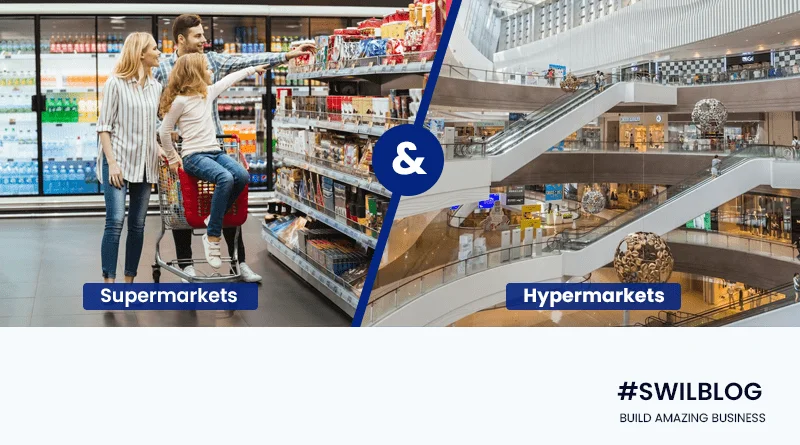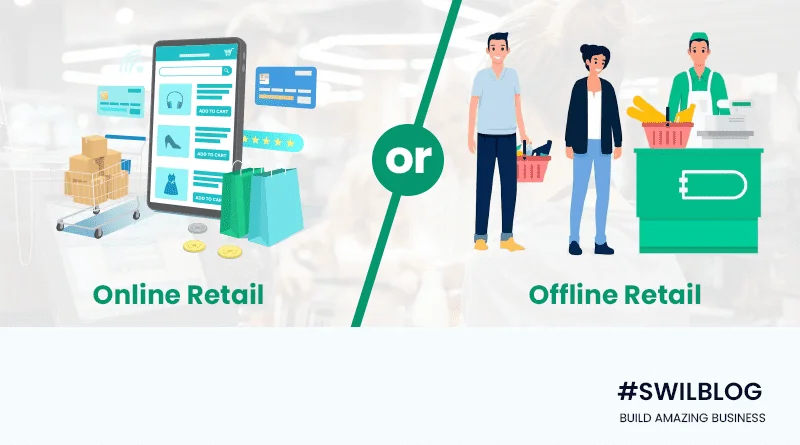Consumers can purchase food, groceries, and household supplies at two retail establishments: hypermarkets and supermarkets. What distinguishes supermarkets and hypermarkets, which are frequently confused with one another? The differences between hypermarkets and supermarkets will be discussed in detail in this article. Let’s look at:
Article Content-
- What is a hypermarket?
- What is a supermarket?
- What are the differences between Supermarkets and Hypermarkets?
- Executive Services and the Shopping Experience
- Discounts and Offers During the Holidays
- Frequently Asked Questions
- Conclusion
What is a hypermarket?
Hypermarkets are large retail establishments that combine supermarkets and department stores. They are known as a one-stop shop for everything you need daily, like clothes, medicines, groceries, and so on.
The hypermarket’s primary goal is to let you buy everything you need in one place. You can save money by shopping at hypermarkets instead of multiple stores for everything from hardware to cosmetics.
A hypermarket is typically more significant than a typical supermarket because it is divided into departmental or shopping stores. Appliances, clothing, and groceries are just a few items available at these markets. Hypermarkets offer everything under one roof: food, electronics, toys, and merchandise.
What is a supermarket?
A supermarket is a big shopping mall where customers can choose their products from sections arranged systematically.
Shopping in supermarkets is done differently—you can use shopping trolleys or baskets to navigate the aisles and pick up whatever you want. Fresh produce and meat were unavailable in the early supermarkets; however, today’s supermarkets offer meat, poultry, bread, and fresh fruits and vegetables. In addition to new and canned food, supermarkets offer a variety of household goods, such as baby goods, cleaning supplies, medication, necessities for pets, kitchen appliances, and crockery, among other things.
To entice customers, these markets provide numerous deals and discounts on their goods in addition to low prices. To attract customers, some even operate with negative profit margins on occasion. To benefit from economies of scale, supermarkets typically acquire their products in large quantities from large distributors or manufacturers.
Customers can easily compare products from various brands because similar products from different brands are displayed nearby.
In addition, the products come with price tags, which make it easier for you to choose the one that best fits your budget.
What are the differences between Supermarkets and Hypermarkets?
Hypermarket Vs. Supermarket: SIZE
Hypermarkets are more giant than supermarkets when it comes to size. Hypermarkets have departmental stores that stock multiple products, despite having shelves that contain various varieties of a particular product.
In contrast, supermarkets are regarded as larger shopping centers that offer a broader selection of goods under one roof. The number of products available to customers determines the size of supermarkets.
Hypermarket Vs. Supermarket: Price
Because of the products’ slightly lower prices, many people shop at hypermarkets. They offer products for less than other retailers in the same industry. In contrast, supermarkets charge more for their products than other retail establishments and nearby stores.
Hypermarket Vs. Supermarket: Frills And Add-Ons
The primary objective of hypermarkets, as opposed to supermarkets, is to provide customers with access to various domestic goods at lower prices. As a result, hypermarkets need more frills and add-ons. The primary objective of a hypermarket is to assist customers in saving as much money as possible.
On the other hand, supermarkets use elaborate marketing strategies to get customers. To get customers to spend more, supermarkets go to great lengths. The primary objective of these businesses is to get customers to buy their products.
Hypermarket Vs. Supermarket: Interior decoration
A supermarket’s interior design features distinctive graphics and colors. In a supermarket, some of the colors and pictures are used to represent a marketing strategy.
The interior decor of a hypermarket is quite appealing. They look more like a warehouse than a shopping center, and their set could be more attractive.
Executive Services and the Shopping Experience
Another difference between a hypermarket and a supermarket is that hypermarkets need to provide the warm service and personal touch of supermarkets, which does not attract many customers. The appearance of a warehouse does not provide buyers with an experience of customer service. On the other hand, supermarkets offer personalized service and excellent executive services. Additionally, supermarkets provide a welcoming and enticing atmosphere that attracts a diverse clientele.
Discounts and Offers During the Holidays
During the holiday season, supermarkets are arousing great excitement by introducing cost-effective marketing strategies and adorning the entire store. The discounted prices of the goods pique a wide range of customers.
Hypermarkets need more marketing and promotional strategies to entice customers to purchase their goods, so there is little excitement during the holiday season.
Frequently Asked Questions
1. In which industry is a supermarket?
Products are sold in the supermarket industry, a retail business where owners typically do not produce or cultivate them. Software for supermarkets can be used to manage the billing process of a supermarket. There are many of the best supermarket software available.
2. Which of the four main types of supermarkets?
1. Conventional supermarkets
2. A limited assortment of supermarkets
3. Supercenters
4. Warehouse clubs
5. Convenience stores
3. What is a small supermarket called?
A convenience store is a small business that sells groceries, snacks, sweets, toiletries, soft drinks, tobacco, newspapers, and other necessities. In contrast to general stores and village shops in rural areas, they are utilized as a convenient complement to larger businesses.
4. What is a hypermarket example?
Customers can shop in one place at hypermarkets. This big-box store aims to offer customers everything they need in a single location. Walmart Supercenter, Fred Meyer, Meijer, and Super Kmart are well-known hypermarkets.
5. Are supermarkets and hypermarkets the same size?
The main difference between a supermarket and a hypermarket is that a hypermarket is a supermarket that also sells expensive items like appliances and is much more significant. Hypermarkets are massive, whereas supermarkets are small.
Conclusion
Swil develops revolutionary software products for the retail, wholesale, and distribution industries. This one-of-a-kind and powerful software suite will change the way you work. Crafted by a business that respects your privacy and is designed for businesses of all sizes.









